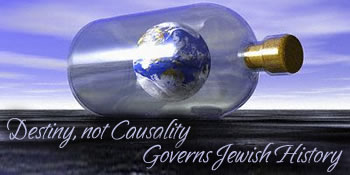
The Patriarchic Covenant introduced a new concept into history. While universal (non-Jewish) history is governed by causality, by what preceded, covenantal (Jewish) history is shaped by destiny, by a goal set in the future.
Universal history is of an etiological nature; every event is brought about by a preceding cause. Event A occurs and B follows, or, colloquially speaking, A begets B. Such history develops almost mechanically, origins determine events; the present is precipitated by the past. Most historians are guided by this principle, namely, that causality (or high probability) dictates unfolding events. When secular scholars try to interpret Jewish history in this manner, they inevitably arrive at bizarre conclusions and distortions.
Covenantal Jewish history, by contrast, is teleological, not etiological. This means that it is propelled by a purpose. What happens to Jews emanates from a Divine promise foretold about the future, rather than by events impelling from the past. Jewish history is pulled, as by a magnet, towards a glorious destiny; it is not pushed by antecedent causes. This is the meaning of the Patriarchic Covenant; it is a goal projected, a purpose pursued, a destination to be reached.
Other nations have suffered lesser catastrophes and have succumbed to the imperatives of historical decline. Not so with the Jew, who emerged out of the Holocaust, not depressed and distraught from the blows of the past, but energized with superhuman zealousness by a dream about the future which the flames of the crematoria could not extinguish.
In the hearts of most Jews, there is an awareness that Israel is a promised land. The promise, a destiny to be fulfilled, is the cause of present exertions; it is not the result of a conglomeration of past events. The drive for Israel is fueled by anticipation, by something beautiful and miraculous which defies precise formulation, which hovers and beckons on the distant horizon. Even secular Zionists, who formally decry all religious terminology and motivations, often speak with Messianic overtones. Destiny, not causality, constitutes the dynamics of covenantal history. The future is responsible for the past.
Destiny and Destination
The word "destiny" is etymologically related to the word "destination." What determines Jewish historical experience is not one's point of departure, but one's destination. There are two types of travelers. Some merely wander about restlessly, unable to stay put in anyone place and going nowhere in particular. Circumstances dictate their movement. An experienced traveler, however, has a destination to which he is rushing, and he wants to get there as soon as possible. And that is precisely the factor that shapes Jewish history, which is unlike the histories of other nations. The Jew is rushing somewhere, and, however, often he is sidetracked, he returns to resume the journey.
What is the destination of the Jew? Where is it on the map?
It is the eschatological redemption, ketz ha-yamim, not only of the Jew and mankind, but of the entire universe, as the prophet foretold: ''The Lord shall be king over all the earth (malkhut shamayim-universal religion); in that day shall the Lord be One and His Name One" (Zech. 14:9). This is the Messianic dream of Judaism and the spiritual goal of Jewish history.
The Patriarchic Covenant created this new concept of historical destiny. It promised Israel a faith, a land, and a future redemption. It pledged, "And I shall make of thee a great nation, and I will bless thee and make thy name great, and thou shalt be a blessing . . . and all the families of the earth shall bless themselves through you" (Gen. 12:2-3). It forged a people with a great destination.
Joseph Ber (Yosef Dov) Soloveitchik (Hebrew: ???? ?? ????????'??) (1903 - 1993) was a great Talmudist and modern Jewish philosopher. "The Rav," as he came to be known, ordained close to 2,000 rabbis over the course of almost half a century.

